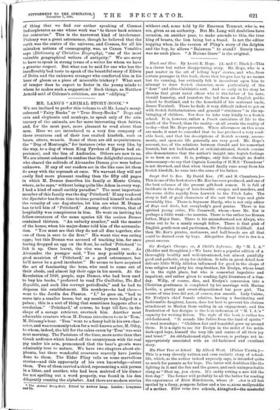Black and Blue. By Ascott R. Hope. (A and C.
Black.)—This is a clever but rather disappointing story. Mr. Hope, who is a past master in the art of telling boys' stories, and who, from certain passages in this book, shows that his pen has by no means lost its cunning, has evidently felt it incumbent upon him to attempt to draw Scotch character, more particularly of the " dour " and ultra-Calvinistic sort. And so early in his story he drowns that great naval officer who is the father of his hero, Gerald Lumsley, and transfers the lad from an English public school to Scotland, and to the household of his maternal uncle, James Turnbull. There he finds it very difficult indeed to get on with Scotch Sabbatarianism and general "strictness" in the up- bringing of children. Nor does he take very kindly to a Scotch school. It is, however, rather a Punch caricature of life to the north of the Tweed, than the reality—at all events the reality of to-day—that Mr. Hope presents. When allowances on this score are made, it must be conceded that he has produced a very read- able book, and that his descriptions of Scotch scenery, amuse- ments, and open-air life generally are very good. Mr. Hope's account, too, of the relations between Gerald and his somewhat boorish, but not bad-hearted or evil-intentioned, Scotch cousins also demonstrates that the author's insight into boyish feelings is as keen as ever. It is, perhaps, only fair—though no doubt unnecessary—to say that Captain Lumsley of H.M.S.' Thunderer ' is not drowned, and that when Gerald finally runs away from his Scotch kinsfolk, he runs into the arms of his father.


















































 Previous page
Previous page